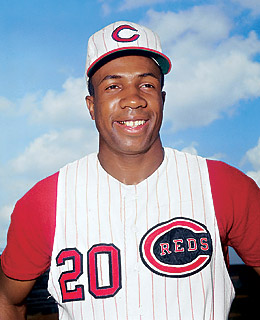
Frank Robinson in 1961.
Here I am, 17 years old, just signed by the Cincinnati Reds, and I join the minor league team in Ogden, Utah. First minute I get some free time in Ogden, I go over to a movie theater. I get to the front of the line and put $10 on the counter. The woman behind the counter says, "We don't serve your kind." I say, "Excuse me?" I mean, I'd heard her say something to me, but I wasn't really focused on what she was saying. "We don't serve your kind." "Well, what kind am I?" She says, "We don't serve blacks. You can't come into this theater." It's hard to describe the shock. Nobody had ever flat-out rejected me before for being black. I took my $10 off the counter and, as I turned away, my eyes filled up with tears. It was the way the lady said it. It set a tone. Go back to where you're staying and don't come out. And that's what I did. I just withdrew. I didn't go anywhere. Probably I should have told people at the ball club what happened. Normally, I think I would have. But I was so crushed that I didn't even think about telling them.